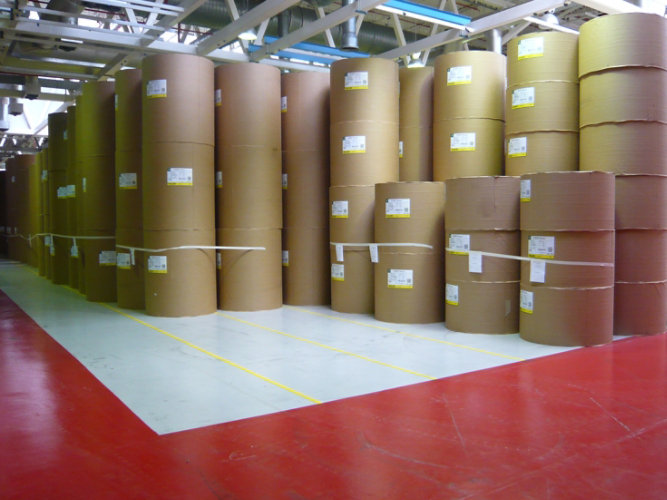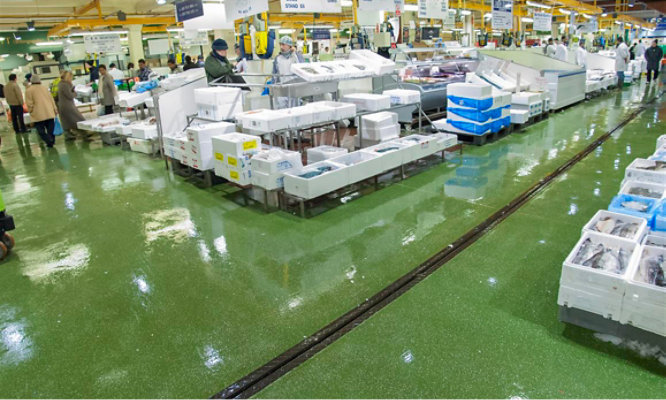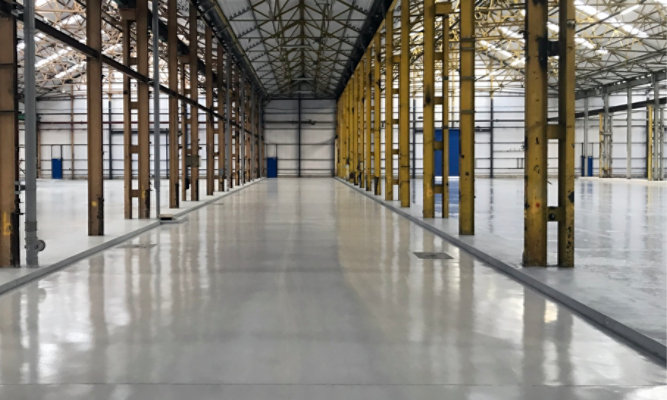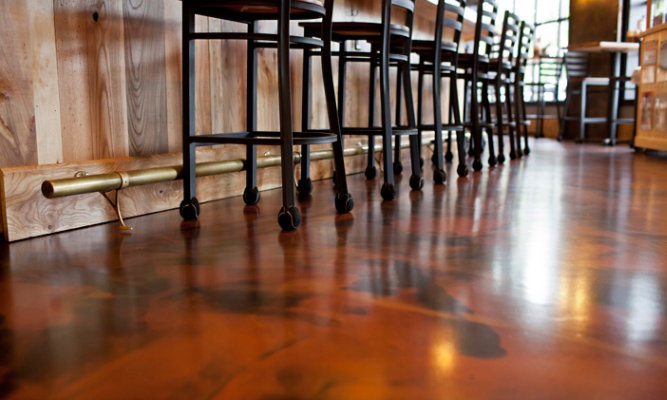Solvent-Based vs. Water-Based vs. 100% Solids Epoxy
The pros and cons of solvent-based, water-based and 100% solids epoxy floor coatings
Different epoxy floor coating systems, whether water-based, solvent-based or 100% solids, offer certain advantages in specific environments. Site conditions can dictate the use of one type over the others, as can contractor preference and facility or company mandates. With so many options, understanding what each product category offers can help you make more informed decisions.
Learn More or Get a Free Flooring Evaluation

Epoxy resins are used broadly in many types of concrete floor finishes and for good reason. Epoxy floor coatings can offer a range of desirable benefits, including:
- Excellent durability
- Outstanding life cycle value
- Easily customized color and appearance
- Flexible installation to accommodate the needs of specific facilities, including:
- Moisture vapor transmission (MVT) mitigation
- Acid, alkali and chemical resistance
- Choice of slip resistance
- Static control properties
However, all epoxy floor coating systems are not created equal. Broadly speaking, there are three basic types being marketed today:
- Water based
- Solvent based
- 100% solids
The Purpose of Solvent-Based and Water-Based Epoxies
Water and solvents are carrier agents in some types of epoxies. They make the epoxy coating easier to apply, assist with adhesion, and provide some self-leveling properties. Additionally, epoxy starts its curing process immediately after mixing the resin and the hardener together, limiting the time available to apply the product. This time factor is called the “pot life.” Without a carrier agent (i.e., a 100 percent solids epoxy), the pot life can be in the range of 30 – 40 minutes. Beyond that point, the blended epoxy will harden in the “pot.” With a water or solvent carrier, the pot life can be increased to approximately two hours, allowing a longer time for the application of the product.
This longer pot life is the result of the carrier agent evaporating from the epoxy. This evaporative process also means that the wet film (when the epoxy is applied) is thicker than the dry film (when the epoxy is cured). The difference can be as much as half the thickness, so a wet film of 7 mils may result in a dry film of 3 to 3.5 mils.
Solvent-Based Epoxy
Solvent-based epoxy was the go-to product type for many years. Its advantages over water-based epoxy systems typically included the following:
- Greater durability and performance
- More tolerant of petroleum contaminates in a concrete surface, making it ideal for garages and parking structures
- Glossier finish
These benefits were ultimately outweighed by the fact that government regulations on products containing volatile organic compounds (VOCs) and other potential pollutants have gotten progressively tighter over the years. With both industry and individual consumers seeking more environmentally friendly alternatives, high VOC solvent-based epoxy systems are no longer the norm.
Water-Based Epoxy
With more limited availability of solvent-based epoxies, water-based epoxy coatings have seen an upsurge in use for specific applications. Their lower regulated VOC content is seen as a clear advantage where restrictions on VOCs are especially stringent. Water-based epoxy coatings typically have a very low to zero solvent content and minimal odor, and depending on the product, can often be applied to concrete while it is still damp or still in the process of curing.
It is only in recent years that water-based epoxy and urethane research and development has made the significant strides necessary to produce materials with the level of chemical resistance and durability needed for commercial and industrial applications. As a result, many of the water-based coatings on the market have yet to catch up with these cutting-edge technologies. Because they often still miss the mark on performance, such older technology products are suited only for lighter duty environments, where more frequent recoating is acceptable. In contrast, Sherwin-Williams High Performance Flooring products, such as those used in the Resuflor Aqua Topcoat TX System, take water-based coating technology to another level. Performing as good as—or in many cases, better than—many solvent-based coatings in terms of stain resistance and hot-tire pickup, these next generation water-based systems are a game changer.
100% Solids Epoxy
100% solids epoxy floor coatings contain no VOCs or water. While they can vary in viscosity, 100% solids epoxies typically produce a thicker dry film when compared to solvent- or water-based coatings. Depending on the product and how it is applied, the film thickness can be 10 mils or more. This has become the norm in industrial and commercial flooring applications.
These epoxy systems provide excellent durability, and depending on formulation and installation technique, can protect concrete from chemical exposure, impact and other abuse. Rather than drying via evaporation, commercial grade 100% solids epoxies cure. These heavy duty coatings are typically comprised of two components, a resin and hardener, which are blended together, creating a chemical reaction that results in a hard, resilient floor surface. When applied to a prepared concrete substrate, high quality 100% solids epoxy coatings can last many years.
Selection and Installation
Sherwin-Williams High Performance Flooring offers a broad range of epoxy flooring systems to help protect, decorate and improve your facility. Contact us to connect with your local flooring expert.
Discover More
Industry Expertise and Innovation
See how we help customers find customized solutions for their project and application challenges.
Article
August 19, 2020
Meeting the Challenging Environmental Demands of the Food and Beverage Market

System Lookup
Find out more about our innovative floor systems for a variety of industries.
FIND A SYSTEM
